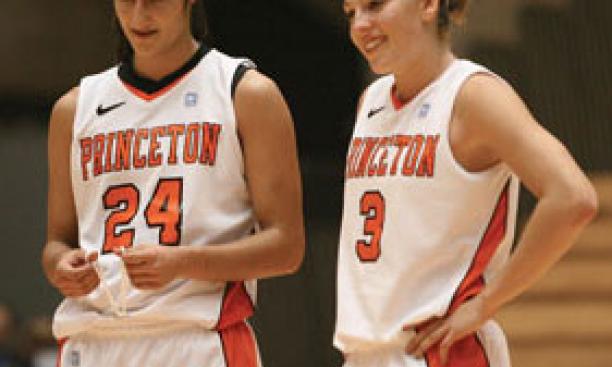

Long before Lauren Polansky ’13 and Niveen Rasheed ’13 shared the basketball court in Jadwin Gym, they played against each other as preteens on the California Bay Area’s soccer fields. In 2008, they became teammates on a top travel basketball team and realized that playing together was better than facing each other. “From the get-go, we automatically had chemistry,” Rasheed said.
Four years later, that chemistry is a key element of the success of the women’s basketball team, which entered league play as the heavy favorite to win a third straight Ivy League title. Before the arrival of Polansky and Rasheed, Princeton never had reached the NCAA Tournament.
After missing last season’s conference games with a torn ligament in her right knee, Rasheed is back in action this season as arguably the best player in the Ivy League, averaging 17.1 points and a league-high 8.9 rebounds per game. Polansky, who was named the Defensive Player of the Year in 2010–11, leads the Ivy League in steals. Center Devona Allgood ’12 and guard Lauren Edwards ’12 also have continued to be major factors in the Tigers’ success.
“It’s a great experience to come in when a program’s low, to turn it around and make it your own,” Polansky said.
In 2008, when head coach Courtney Banghart was recruiting Polansky and Rasheed, she suggested they visit campus together. Rasheed never had expected to leave California for college, but soon after Polansky committed to the Tigers, Rasheed followed. “There is no other person I would have wanted to be my point guard,” Rasheed said.
An athletic and physical forward, Rasheed led the Tigers in scoring and rebounding as a freshman and unanimously was named the Ivy League Rookie of the Year. In her truncated sophomore year, she averaged 16.4 points per game, a pace she has resumed this winter.
Polansky’s talents were harder to pinpoint in the box score: In her rookie season, she scored the fewest points per minute of any player in the Ivy League. But her competitiveness impressed Banghart so much that Polansky was named the starting point guard as a freshman for a team that went undefeated in conference play and finished 26–3 overall. This season, Polansky has shown flashes of improved scoring, netting 12 points in a big win over Marist.
Banghart says she rarely puts Rasheed and Polansky on the same team in practice “because they just win all the time.” Their chemistry is enhanced by their complementary styles — Polansky knows where and when to deliver the ball, Rasheed knows how to finish it, and each player will rebound the other’s missed shot or cover any assignment on defense.
Facing one of the toughest non-conference schedules in the nation this season, the Tigers went 10–4. There’s a long Ivy League season ahead, but the team already has routed Penn 83–48. If Rasheed and Polansky, still juniors, can help Princeton win two more league championships, their class may go down as one of the best in Ivy League history.
